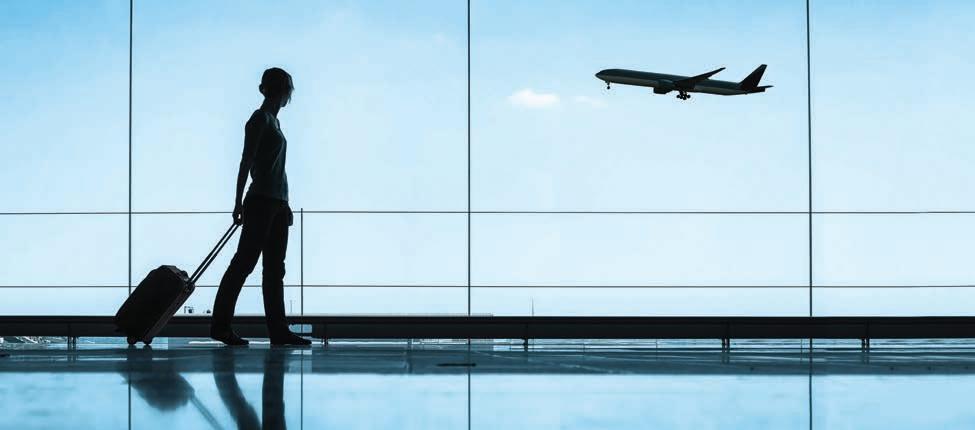
3 minute read
Managing the Risks of Business Travel
With the growing likelihood of travel bubbles opening up as the world learns to live with COVID-19, businesses must review the risks and instill confidence in travellers. – By Todd Handcock
Since the COVID-19 outbreak, virtual work has been necessary to conduct effective business. However, with travel bubbles opening (1) and COVID-19 testing, companies are preparing for the gradual resumption of business travel. For some organisations, it’s already arrived – either domestically, or through bi-lateral agreements that enable essential business to be conducted abroad, in person.
Advertisement
Now is the time to review existing travel risk management solutions and ensure they remain fit for purpose – especially since the International Standards Organization will soon publish its travel risk standard (ISO 31030); created to help organisations manage the challenges faced with the fast-changing landscape that surrounds business travellers. Here are seven key factors to address:
1. A moving threshold for essential travel
Travel policies must be continually reviewed to align with the constantly changing landscape of COVID-19 safety risks, travel restrictions and border closures. As we’ve seen from recent travel bubble openings and poppings, things can change quickly. This moving threshold for essential travel necessitates multiple approval points and multiple layers of risk assessment; transforming the question of essential travel from a permission-seeking process, into one where individual traveller needs and well-being are central.
2. Individual-based risk assessments
Particularly during COVID-19, businesses must understand individual risk profiles to determine travel authorisation and provide tailored support. This includes physical conditions like asthma, as well as mental health needs. An additional challenge is to comprehend employee health risks without violating workplace privacy law; explaining why many companies turn to an independent medical assistance provider.
3. Robust scenario planning
With the strong potential for unexpected airspace and border closures, businesses must continually track the situation; managing large amounts of intelligence to understand what’s happening at any given moment, and with absolute clarity on roles and responsibilities to ensure nothing falls through the cracks. Additionally, companies must be agile enough to quickly adapt plans real-time, as conditions change.
4. Safety at every touchpoint
The COVID-19 pandemic has revealed the need for intelligence across the entire supply chain of the journey. Travellers need to know that they are protected at every step – from airline, to ground transport, accommodation and beyond. Companies have an increased duty of care to demonstrate that they are continually reviewing all touchpoints, including Safeguard your employees; mitigate the collection of post-trip feedback.
5. Outsourcing travel risk management to the
As managing corporate travel becomes ever more complex in light of COVID-19, in-house travel managers and security directors are asking for more resources and support. We can expect to see more outsourcing to a Travel Risk Management (TRM) provider that offers security and in-house medical expertise to support corporate travel needs in a comprehensive way, or to take on one or two critical elements.
6. A ‘carrot’ approach to compliance employees.
Amidst COVID-19, compliance is critical to protect employees about safe travelling. Taking a carrot rather than a stick approach can be particularly useful – encouraging travelling employees to book in-channel by offering associated travel benefits. Premium lounge access, for example, is now even more in demand as lounges offer a well-maintained place away from the crowds. Access to a medical helpline also provides employees 24/7 help at their fingertips, regardless of their location.
7. Clear communication
A Collinson survey (2) conducted before COVID-19 found that while 50 per cent of employers have invested in medical and security assistance, 51 per cent of employees are unsure of what it offers. Now is a critical time to communicate what assistance is available, how to access it, and what’s been updated. Businesses must demonstrate their commitment to duty of care, while also instilling confidence in employees about safe travelling.
EMPOWER AND PROTECT YOUR MOST VALUED ASSETS
If you have employees who undertake regular business meetings or who travel for work, you have a responsibility to keep them safe – in turn, mitigating organisational risk.
Collinson is pleased to support responsible businesses in Hong Kong looking to evolve their current arrangement through a purpose-built solution.
• Pre- and post-meeting RT-PCR COVID-19 tests (99.9 per cent accurate)
• Priority Pass lounge access for a safe space when travelling
• 24/7 medical hotline – available while at home, in the office or abroad
Safeguard your employees; mitigate organisational risk.

(1) https://www.scmp.com/news/hong-kong/hong-kongeconomy/article/3105607/coronavirus-hong-kong-singaporeset-reveal
(2) https://www.collinsongroup.com/en/insights/travel-assistanceambiguity-leaving-business-travellers-unaware-of-whats-onoffer-to-them





